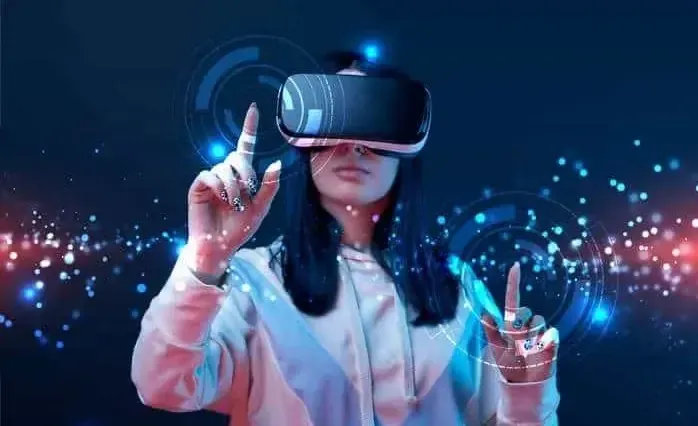Imagine a world where you can attend a concert on Mars, sit front row at Paris Fashion Week from your bedroom, or star in your action movie—all without leaving your house. Welcome to the Metaverse, the next evolution of digital interaction and possibly the biggest thing to happen to entertainment since the invention of television.
But is it just hype, or are we witnessing the future of entertainment unfold before our eyes?
Let’s take a deep dive into the Metaverse, virtual reality (VR), and how they’re shaping the entertainment industry as we know it.
What Is the Metaverse?
The Metaverse is a virtual, interconnected universe where users can interact with each other and digital environments in real time. Think of it as the internet, but immersive. It combines virtual reality (VR), augmented reality (AR), and 3D digital spaces, allowing people to live, work, play, and most importantly—be entertained—in entirely new ways.
It’s not just one app or game—it’s a digital lifestyle.

How Virtual Reality Powers the Metaverse
VR is the gateway to the Metaverse. Users are immersed in completely immersive worlds through the use of virtual reality headgear such as the Meta Quest, HTC Vive, or PlayStation VR. Whether you’re exploring a fantasy land or attending a comedy show in a virtual nightclub, the experience feels real because your brain thinks it is.
With spatial audio, haptic feedback, and motion tracking, VR blurs the line between the physical and digital, creating the perfect playground for next-gen entertainment.
A New Era of Live Entertainment
Remember when live concerts required buying tickets, traveling, and standing in long lines? Not anymore. Artists like Travis Scott, Ariana Grande, and Marshmello have already performed in virtual arenas inside Fortnite, pulling in millions of fans, without a single stadium seat.
In the Metaverse:
- Concerts happen in digital worlds with no capacity limits.
- Fans can interact with the show, not just watch it.
- Artists can design mind-bending performances that defy real-world physics.
It’s not just live music—it’s next-level immersive art.
Virtual Cinemas and Storytelling Reinvented
The future of film? It might be interactive.
Imagine watching a horror movie where you choose whether the character runs or hides. Or sitting in a virtual IMAX theatre with friends across the world—chatting in real time as the film plays.
Metaverse platforms like Bigscreen and AltspaceVR are already hosting:
- Virtual film screenings
- Interactive movie experiences
- 3D content premieres with Q&A sessions from directors and stars
The result? A shared, social movie experience that feels more alive than passive screen-watching.
Gaming: The Metaverse’s First Frontier
If there’s one industry that’s already thriving in the Metaverse, it’s gaming.
Games like Roblox, Decentraland, and The Sandbox allow users to create, explore, and monetize digital worlds. Gamers are no longer just players—they’re creators, merchants, and event hosts.
In the Metaverse:
- Your avatar can own property, run a business, or host virtual events.
- Games evolve into social platforms.
- Players can earn real-world income through NFTs, crypto, and in-game commerce.
Gaming is no longer just about winning. It’s about living another life entirely.
Celebrity Culture Meets the Digital Age
In the Metaverse, celebrities aren’t just followed—they’re digitally accessible.
Stars like Snoop Dogg, Paris Hilton, and Justin Bieber have already bought land, hosted events, or launched brands in virtual spaces. The rise of virtual influencers like Lil Miquela shows how blurred the line between real and digital fame has become.
The entertainment world is shifting:
- Red carpets are turning into digital runways.
- Meet-and-greets are happening through VR meetups.
- Fan engagement is happening in persistent virtual worlds.
Fandom has gone futuristic.
The Role of NFTs and Digital Ownership
A huge part of entertainment in the Metaverse is the rise of NFTs (Non-Fungible Tokens). These digital collectibles are changing how we think about ownership.
Now, fans can:
- Own a moment from a concert
- Buy a limited-edition skin worn by their avatar
- Invest in digital real estate or artwork
NFTs offer fans a new way to interact and artists a new opportunity to make money.
Is the Metaverse Accessible Yet?
Right now, the Metaverse still has a few barriers:
- VR headsets can be pricey.
- High-speed internet is a must.
- Some platforms require crypto wallets and tech knowledge.
But accessibility is improving fast. Affordable VR headsets, user-friendly interfaces, and mainstream brands jumping in (like Nike, Netflix, and Disney) are helping lower the learning curve.
As tech gets cheaper and easier, mass adoption is inevitable.
How Hollywood and Big Media Are Investing
Major players are going all-in on virtual entertainment.
- Disney is exploring metaverse theme parks.
- Netflix is testing interactive content in virtual spaces.
- Warner Bros. is partnering with Metaverse platforms for promotions.
These companies aren’t just dipping toes—they’re building full digital ecosystems to stay ahead of the curve.
The Social Side: Virtual Hangouts and Digital Friendships
Entertainment isn’t just about what you consume—it’s about who you share it with. The Metaverse enables:
- Virtual hangouts in 3D lounges
- Watch parties with avatars reacting in real time
- Global communities gathering for shared experiences
It turns passive consumption into interactive social entertainment.
Challenges and Criticisms
Not everything is rosy in Metaverse land. Critics point out:
- Privacy concerns with data collection in immersive environments
- Digital addiction and mental health effects
- A risk of widening the digital divide
The Metaverse also raises big questions about identity, ethics, and control—who builds these worlds, and who governs them?
These are valid concerns that must be addressed as the space evolves.
So… Is Virtual Reality the Future of Entertainment?
Short answer: Yes—but not overnight.
The Metaverse and VR are laying the foundation for an entertainment revolution, but it’s still early days. Like the internet in the 90s, what feels clunky and experimental today could become second nature tomorrow.
With continued innovation, mass adoption, and creative vision, virtual reality has the potential to become the dominant medium for how we play, connect, and experience stories.
So grab your headset—or at least keep an open mind. The next era of entertainment is being built right now.
FAQs
1. Do I need a VR headset to enter the Metaverse?
Not always. Many platforms are accessible via PC or mobile, but a VR headset provides the most immersive experience.
2. Is the Metaverse safe for kids?
It depends on the platform. Some have age restrictions and parental controls, but supervision is key.
3. Can I earn money in the Metaverse?
Yes! Through things like NFTs, virtual goods, services, and event hosting, creators and players alike can earn real income.
4. Will movies and concerts disappear in real life?
No, virtual experiences will likely coexist with traditional ones, offering new ways to enjoy entertainment.
5. Is VR entertainment just a fad?
Nope. With billions in investment and major tech adoption, VR and the Metaverse are here to stay—and grow.




